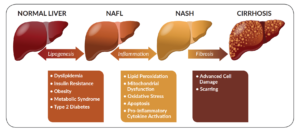Deep Dive into Fatty Liver Disease: NAFLD and NASH
Dr. Claire Arcidiacono, ND
One of the most common concerns that people call about is fatty liver. Since NASH is a progression, or worsening of NAFLD I wanted to talk about them both in one blog. To start at the very beginning what even is NAFLD? Well it stands for nonalcoholic fatty liver disease. As the name implies this is a type of liver disease that occurs in people who drink little to no alcohol. Basically what happens in this situation is that too much fat begins to build up in the liver. Over time as the fat begins to accumulate it cause’s the liver cells to swell and become damaged. As the disease progress’s it progress to NASH, this stands for nonalcoholic steatohepatitis. So to sum things up for you NAFLD and NASH are both conditions where excess fat accumulates in the liver. NAFLD does not involve liver damage but can progress to NASH which does involve liver damage. (1) Please see the attached picture. (2)

How you are normally diagnosed with NAFLD? Well there are some blood tests that can rule out other diseases as well as determine if any liver damage is present. These tests can include a CBC (complete blood count), iron studies, liver enzyme and liver function tests. Other tests can include testing for hepatitis A, C and others. It is also important to test for celiac, fasting blood sugar (Including HA1C) and a lipid profile. In addition to blood work there are a number of imaging tests that can be done. These include abdominal ultrasound, MRI, CT scan, transient elastography and magnetic resonance elastography. Lastly depending on the results of other tests your doctor may recommend a liver biopsy. (3)
What are the symptoms of NAFLD and/or NASH? Well as the disease progress’s your symptoms will also become more severe. To start you may experience fatigue. You may just “not feel good” or have a feeling of malaise. Lastly there may be pain in the upper belly area. As the disease progresses to NASH and even eventually cirrhosis symptoms will also progress. You will start to notice itchy skin, red palms and even yellowing of the skin and eyes (jaundice). You may notice abdominal swelling (ascites) and swelling in your legs. You may experience shortness of breath. Spider veins may also develop. There may be enlargement of the spleen. (1) In addition to these symptoms there maybe rapid weight loss. (4)
Now moving on what are the risk factors for fatty liver? While the exact reason that some people develop fatty liver is not well understand there are some known risk factors. For example both NAFLD and NASH are linked to genetics, and being overweight or obese. Having insulin resistance, diabetes and high cholesterol all increase your risk. Other risk factors include metabolic syndrome, PCOS, sleep apnea and either hypothyroidism and/or hypopituitarism. Growth hormone deficiency can also increase risk. Lastly being over 50 can increase risk of NASH. (1)
Fatty liver can have severe complications. Let’s start with some of the more serious complications of NASH. Approximately 1 in 5 people with NASH will develop cirrhosis. Additionally 1 in 8 with NASH and cirrhosis will develop liver cancer. NASH is also the leading cause of liver transplants in women and the 2nd leading cause in men. NAH may shorten life expectancy. (5) Other complications can include swollen veins in the esophagus, which can rupture and bleed. You may have hepatic encephalopathy which presents as confusion, sleepiness and slurred speech. Your spleen may become overactive which can lead to a reduction in platelets. Lastly as previously stated you may develop ascites. (1)
How to reduce fatty liver?
- Diet! What you eat matters. It is important to eat a diet rich in fruits and vegetables and healthy lean proteins. Stick to whole foods rather than processed. Avoid excess sugar and alcohol. (1) To help with intake of fruits and vegetables check out our Greens Hx, Organic Greens and our Reds Hx!
- Keep to a healthy weight since being overweight/or obese is a risk factor. (1)
- NAC has been found to be protective of the liver and even improve liver health in those with NAFLD and NASH. (6) Please see Invite’s NAC, Detox Hx and even Daily Detox powder!
- Milk Thistle has been found to help improve liver enzymes in those with NAFLD. (7) Please see Invite’s Milk Thistle and Hepatox and once again the Daily Detox powder!
- Catalase deficiency has been found to be associated with an increased risk of fatty liver. (8) Please see Invite’s Catalase.
- Omega 3 have been found to help with fatty liver. (9) Please see Invite’s Fish Oil and Krill Oil.
- Please see my blogs on Sterols Plus and Gluco Hx for more information on these amazing products!
Next up our product highlight will be Daily Detox powder!
Sources:
- https://www.mayoclinic.org/diseases-conditions/nonalcoholic-fatty-liver-disease/symptoms-causes/syc-20354567
- https://www.caymanchem.com/news/research-tools-for-fatty-liver-diseases
- https://www.mayoclinic.org/diseases-conditions/nonalcoholic-fatty-liver-disease/diagnosis-treatment/drc-20354573
- https://fatty15.com/blogs/news/fatty-liver-symptoms
- https://www.rezdiffra.com/about-nash
- https://www.ncbi.nlm.nih.gov/pmc/articles/PMC3270338/#:~:text=N%2Dacetylcysteine%20(NAC)%20is,liver%20enzymes%20has%20been%20investigated.
- https://www.ncbi.nlm.nih.gov/pmc/articles/PMC9149185/#sec4title
- https://www.sciencedirect.com/science/article/abs/pii/S0891584919306604#:~:text=Highlights%20*%20%E2%80%A2%20Catalase%20deficiency%20accelerates%20nonalcoholic,Peroxisomal%20redox%20imbalance%20accelerates%20ER%20stress%2Dmediated%20NAFLD.
- https://clinicalnutritionespen.com/article/S2405-4577(21)00226-6/abstract#:~:text=3%20as%20capsule.-,Results,0.8;%20P%20=%200.01).








